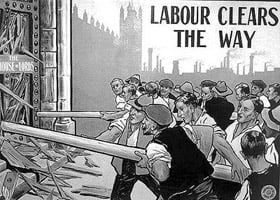The government is trying to push a proposal through Parliament to
increase the length of time a suspect can be detained without charge to 42
days. This is seen as an anti-terrorism measure. The proposal has triggered a
lot of debate within the labour movement and in society as a whole. This debate
has spilled over to the broader issues of civil liberties, as David Davis has
resigned his seat in Parliament to run a by-election on the issue.
To make the comparison, none of the other countries within the European
Union threatened with a campaign by terrorists feel the need to keep suspects
banged up for longer than seven days, apart from Australia, where it’s 12 days.
In Canada it’s 1 day, and in New Zealand, the USA and Germany it’s 2. Till
2005 the detention period in the UK was 14 days. Tony Blair then tried to
change the law to allow detention for 90 days. He was defeated in the Commons,
but 28 days was accepted as a ‘compromise’.
Readers will spot the pattern. The government comes forward with an
absurd proposal. Rank and file MPs vote it down. While they are busy
congratulating themselves on a defence of our ‘historic civil liberties’ they
fail to notice that the detention period has been doubled in the process of what
is described as a ‘compromise.’ A year or so later the government again comes
to parliament with claims to still more ridiculous and oppressive proposals. If
the 42 day period is carried, the government will be back for more. Think of a
number, then double it – that’s the strategy.
Britain actually has a good record in the defence and promotion of civil
liberties. It is something we can be proud of. It is true that Habeas Corpus (a
writ demanding a prisoner be tried or released, with no indefinite detention)
is part of the rights associated with Magna Carta, which was actually a
document of struggle between the barons and the king in the middle ages. But
the right to habeas corpus was defended by the pioneers of the labour movement
and frequently denied against the pioneers of the labour movement by the
establishment. Democracy and civil liberties in this country are a conquest of
the working class.
What argument does the government use as excuse for eliminating rights
and liberties we have defended for hundreds of years? Not much. The authorities
present the ‘war against terror’ as one that demands secrecy on their part.
They hint darkly that lives are at risk if they tell us what they know, but
that the situation is grim. Trust us!
There’s the problem. We know that this government is a pack of liars. We
all remember the fictitious ‘weapons of mass destruction’ that were used as an excuse
for the illegal and disastrous invasion of Iraq. Yet they arrogantly refuse to
argue a case. Jacqui Smith, the present Home Secretary, is a talentless
crawler, of the kind Gordon Brown likes to surround himself with under the
mistaken impression that it makes him look good. She has proved incapable of
assembling a convincing case for repression.
 New Labour Ministers correctly point out that David Davis is a curious
New Labour Ministers correctly point out that David Davis is a curious
defender of civil liberties. He is a supporter of the odious Section 28, a
piece of Tory legislation designed to justify homophobia. He supports capital
punishment. But his eccentric stand has lifted him above the conformist
riffraff on the New Labour front benches and the pathetic ‘payroll vote’ that
provides the Parliamentary support for 42 days. In the end they relied on the
votes of minority parties such as the piquantly titled Democratic Unionist
Party to get the measure through the Commons.
Gordon Brown has decreed that Labour will not stand against Davis in the
forthcoming by-election. In other words New Labour hasn’t got the guts to argue
its case in public debate. Brown has proved hopeless at defending his case at
Prime Minister’s question time. It is becoming increasingly difficult to argue
that this is because he is too cerebral for the rough and tumble of
parliamentary debate. It’s because there is no case for the measure. Even the
agencies of the state are divided on the proposal.
The government says 42 days will be very rarely used, and then only with
Parliamentary approval. This part of the proposal is shot through with holes.
It is not evident how Parliament will get information about the background to any
referral, since the government’s whole case is that secrecy and keeping us all
in the dark is their first weapon in the ‘war on terror.’
Still Brown defends the proposal
in press conferences and other formats where other people can’t answer back and
he believes he will be shown the deference his position entitles him to. There
he argues that a person’s first and most important right is to stay alive. The
problem with this is that all of us Londoners who travel by public transport
(not Ministerial limousine, as Brown does) know that the government was
incapable of saving innocent lives in 2005. They put us in danger from suicide bombers by invading Iraq. This is
not to justify the 2005 bombers, of course, but the occupation and murder of up
to a million civilian Muslims obviously poisoned relations with Muslims in
Britain. 42 days will further outrage Muslims everywhere and serve to convince
them that the government is at war with them.
The behaviour of junior Ministers, anxious for preferment, has been shameful.
Andy Burnham smears Chakrabarti when he
accuses Davis of having “late night hand wringing, heart melting phone calls
with Sami Chakrabarti,” Director of Liberty. Sami is actually widely respected
for her consistent defence of civil liberties. Burnham is known as a toad. He
has form. In 2005 he accused the LSE’s Identity Project, a work of 60 academics
criticising the government’s ID card project of being the work of a single
disgruntled scholar. He was convicted of ‘systematic and malicious deception.’
We almost give up on looking for reasons for the government’s proposal.
We look instead at who they aim to please by bringing it forward. The answer,
inevitably, is Murdoch. This American billionaire, who is proud to pay no tax
in this country, is telling Brown through the ‘Sun’ what government policy ought
to be.
It is actually the case that not a single person
has been held under the 28 days’ detention accepted in 2005. So why do they
want 42? New Labour are trying to scare us with the ‘terrorist threat’ in order
to erode our rights and liberties and hand more power over to the state. Engels defined the state as
"bodies of armed men." The state is a standing threat to the labour
movement. We must defend every democratic right in the struggle to unite
the mass of society in the fight for genuine socialist democracy. The labour
movement must support the campaign against 42 days’ detention.






